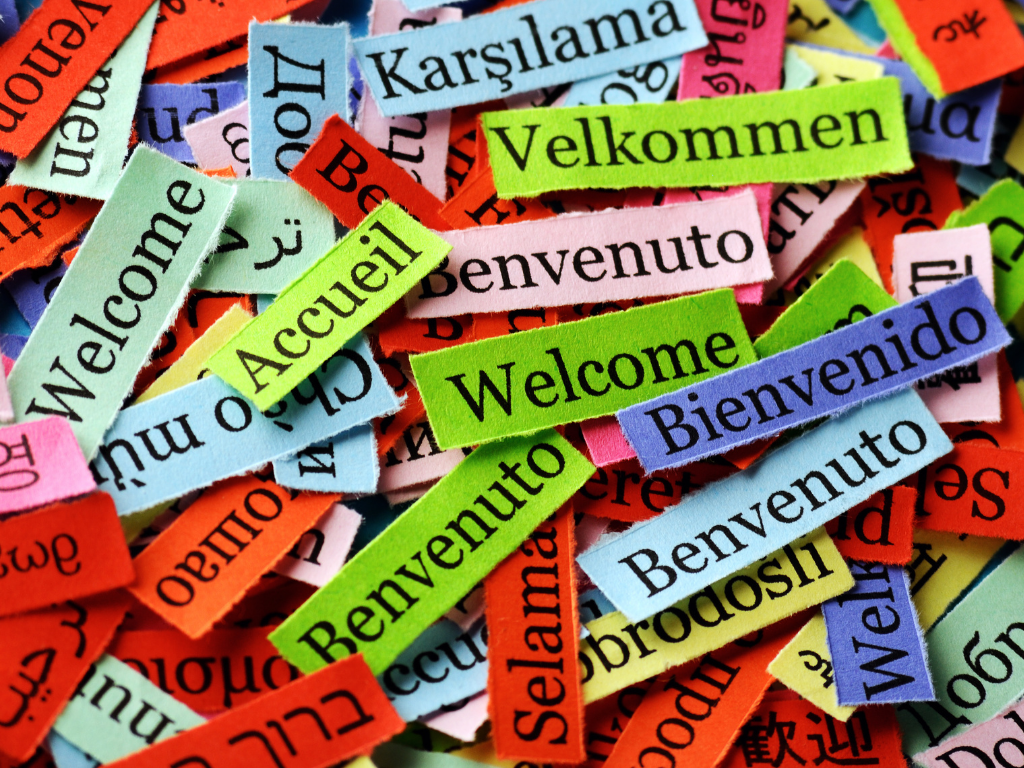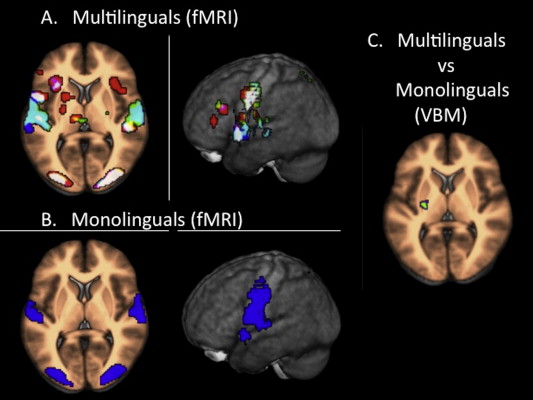Recent studies estimate that over half the world’s population is multilingual to some extent, speaking more than just one language. When a person is multilingual, they reap the social benefits of being able to communicate with and blend into a whole new community and culture of people.
But there are other significant benefits to speaking more than one language such as career benefits and, the subject of this article, the cognitive benefits of being multilingual. In fact, these benefits can positively and profoundly impact your cognition until well into old age! So, read on to discover some of the many cognitive benefits of being multilingual!
[And for a complete toolkit for how to teach yourself a language, check out the best ways to learn a language on your own.]
8 Demonstrated cognitive benefits of being multilingual

1. A better, innate understanding of how language works
Because learning a second (or third, or fourth) language brings your attention to the mechanics of the two languages, (including how they differ), multilingual people tend to understand things like grammar, conjugations, and sentence structure better than monolinguals. These people can more quickly pick up on the structure of any language and clearly understand how it can be used.
Multilingual people also tend to be more effective communicators, more exact editors, and more compelling writers, because they better understand how languages function, including in their native language.
Read: 'Why you should practice SPEAKING a second language'
2. Less mental decline in old age
Many studies have shown that the more elderly people "exercise" their brains every day, the less cognitive decline they experience overall. And it turns out that jumping between languages—or acquiring a new one—is a particularly effective way to attain this benefit!
Read: 'Learning a new language when you’re older and how to do it!'

In fact, several studies have demonstrated that bilingualism can delay the onset of dementia and Alzheimer’s disease by an average of five years! Even better, bilingual patients who do develop Alzheimer’s tend to display less decay in cognitive abilities than monolingual patients.
3. More efficient and better developed executive control in the brain
When you are multilingual, you constantly switch between languages without thinking about it. And this is why multilingual people tend to have better developed executive control systems, the part of the brain that controls your ability to switch your attention between things and exercise working memory. A more developed executive control system allows multilingual people to better perform tasks that require high-level thought, multitasking, and sustained attention.
Psssst! Check out Brainscape's flashcards for any foreign language to learn twice as efficiently as any other study method!
4. Greater cognitive flexibility and problem-solving skills

Learning a new language requires the brain to express similar thoughts in different ways and because of this multilingual people develop greater cognitive flexibility. This translates into other areas as improved creativity and problem-solving, as well as the ability to perceive situations in different ways. Multilingual people tend to solve complex problems in more creative ways than their monolingual peers, no matter what kind of problem is being solved.
5. Improvements in learning abilities
As mentioned earlier, multilingual people have more developed executive functions. One important executive function is inhibition, the ability to discard irrelevant or unimportant stimuli and focus on the key stimuli. Inhibition is key to learning new information and skills, as it allows you to focus on what's important while reducing interference from what you already know, as well as similar concepts. Since multilingual people have better-developed inhibition, studies demonstrate that they can not only learn a third or fourth language quicker, but can develop any learned skill faster.
6. Changes in neurological processing

Brain imaging techniques, such as fMRIs, have shown that multilingual brains tend to activate the linguistic portion of their brains even when not engaged in linguistic tasks. This leads researchers to believe that the brain’s ability to connect skills tends to enhance cognitive function over time. Bilingual brains tend to show higher level of activation to auditory stimuli overall, which gives them an advantage in sensory processing. Even the actual structure of the brain is affected.
Studies show that multilingual people have a higher density of grey matter in their brains, and older bilingual people usually have better-maintained white matter, even late in life. The cognitive control required to manage multiple languages seems to broadly impact neurological function and structure, fine-tuning cognitive control mechanisms and sensory processes.
7. More rational decision-making skills
A study done at the University of Chicago demonstrated that bilinguals tend to make more rational decisions. As language contains nuance and subtle implications in its vocabulary that can subconsciously influence your judgment, thinking in your native language tends to be fraught with emotional biases. Interestingly, though, multilingual people tend to be less affected by such biases, especially in their second language. Bilinguals are able to draw from their understanding of a problem using both languages, which allows them to rely more on analytic processes than emotional linguistic cues.
Read: How brain science can help you learn a language faster
8. A more perceptive understanding of the world

Multilingual people tend to be better at observing their environment and spotting misleading information. Perhaps this is because of their enhanced inhibition skills that allow them to focus on relevant information and edit out the rest. Due to this, multilingual people have been shown to be keen observers of the world around them, as well as more skilled at identifying and correctly analyzing the sub-context of a situation and interpreting the social environment. This makes multilingual people highly perceptive, a skill that's also exercised by interacting with the unfamiliar social or cultural context of a second language.
Multilingualism is great for your brain
As you can see, the cognitive benefits of multilingualism can potentially outweigh the concerted effort of learning a new language. This is especially true when you find an effective and simple way to develop your linguistic skills.
[See also: Should you learn a language? Maybe not (and that's ok)]
If you're seriously thinking about learning a new language, you should check out Brainscape's groundbreaking spaced repetition system for learning a language, which makes learning a new language as efficient as possible for learners of any level.
If you are still monolingual or are simply ready to tackle your next language, check out the many foreign language flashcards we have, and get started today!
References
Bartolotti, J., & Marian, V. (2012). Language learning and control in monolinguals and bilinguals. Cognitive Science, 36(6), 1129–1147. https://doi.org/10.1111/j.1551-6709.2012.01243.x
Bialystok, E. (2015). Bilingualism and the development of executive function: the role of attention. Child Development Perspectives, 9(2), 117–121. https://doi.org/10.1111/cdep.12116
Costa, A., & Sebastián-Gallés, N. (2014). How does the bilingual experience sculpt the brain? Nature Reviews. Neuroscience, 15(5), 336–345. https://doi.org/10.1038/nrn3709
Craik, F. I., Bialystok, E., & Freedman, M. (2010). Delaying the onset of Alzheimer disease. Neurology, 75(19), 1726–1729. https://doi.org/10.1212/wnl.0b013e3181fc2a1c
Gallo, F., DeLuca, V., Prystauka, Y., Voits, T., Rothman, J., & Abutalebi, J. (2022). Bilingualism and aging: Implications for (Delaying) Neurocognitive Decline. Frontiers in Human Neuroscience, 16. https://doi.org/10.3389/fnhum.2022.819105
Grosjean, F. (2012, September 19). How Many Are We?: On the difficulty of counting people who are bilingual. Psychology Today. https://www.psychologytoday.com/intl/blog/life-as-a-bilingual/201209/how-many-are-we
Ingmire, J. (2015, May 11). Children exposed to multiple languages may be better natural communicators. University of Chicago News. https://news.uchicago.edu/story/children-exposed-multiple-languages-may-be-better-natural-communicators
Keysar, B., Hayakawa, S. L., & An, S. G. (2012). The Foreign-Language effect. Psychological Science, 23(6), 661–668. https://doi.org/10.1177/0956797611432178
Penn State University. (2011, February 18). Juggling languages can build better brains. https://www.psu.edu/news/research/story/juggling-languages-can-build-better-brains
Pliatsikas, C., Meteyard, L., Veríssimo, J., DeLuca, V., Shattuck, K., & Ullman, M. T. (2020). The effect of bilingualism on brain development from early childhood to young adulthood. Brain Structure and Function, 225(7), 2131–2152. https://doi.org/10.1007/s00429-020-02115-5
Xia, T., An, Y., & Guo, J. (2022). Bilingualism and creativity: Benefits from cognitive inhibition and cognitive flexibility. Frontiers in Psychology, 13. https://doi.org/10.3389/fpsyg.2022.1016777
